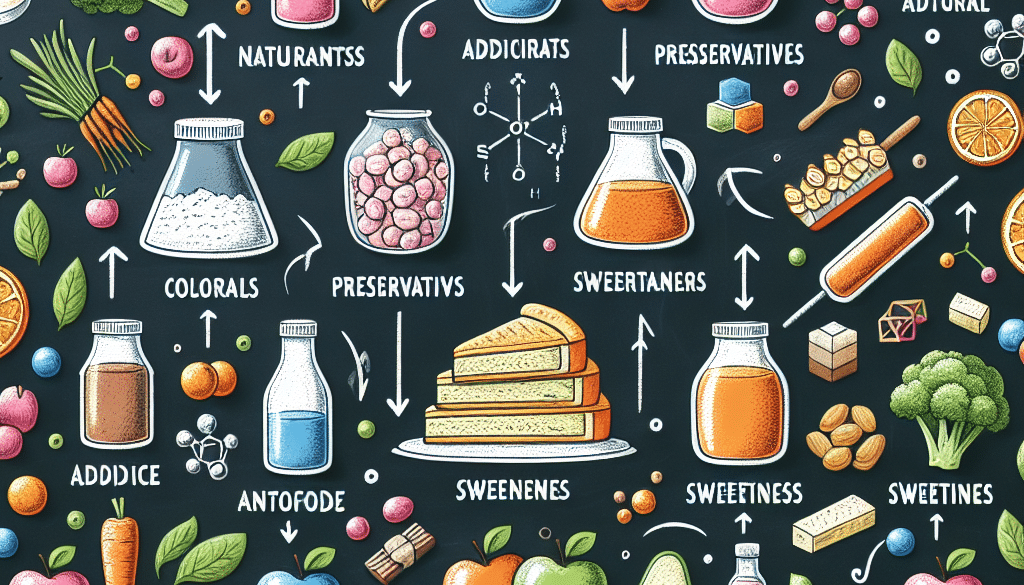The Role of Food Additives
-
Table of Contents
- Exploring the Crucial Role of Food Additives in Modern Diets
- Understanding Food Additives
- The Benefits of Food Additives
- Case Studies and Statistics
- Regulation and Safety of Food Additives
- Consumer Perceptions and Trends
- Conclusion: Balancing Benefits and Concerns
- Discover ETprotein’s High-Quality Protein Products
Exploring the Crucial Role of Food Additives in Modern Diets

Food additives have become an integral part of the food industry, playing a vital role in ensuring food safety, enhancing flavor, and improving the shelf life of products. With the increasing demand for processed foods, the use of additives has grown exponentially. This article delves into the multifaceted role of food additives, their benefits, and the considerations surrounding their use.
Understanding Food Additives
Food additives are substances added to food to maintain or improve its safety, freshness, taste, texture, or appearance. There are several types of food additives, including preservatives, flavor enhancers, coloring agents, emulsifiers, stabilizers, and thickeners. Each serves a specific purpose and is regulated by food safety authorities to ensure consumer health is not compromised.
The Benefits of Food Additives
- Preservation: Additives such as nitrates, sulfites, and benzoates prevent spoilage from bacteria, molds, and yeast, extending the shelf life of foods.
- Consistency: Emulsifiers, stabilizers, and thickeners ensure that products like dressings, sauces, and creams maintain a uniform texture and do not separate.
- Taste and Appearance: Flavor enhancers and colors improve the palatability and visual appeal of food, making it more enticing to consumers.
- Nutritional Enhancement: Vitamins and minerals can be added to foods to improve their nutritional profile, addressing dietary deficiencies.
Case Studies and Statistics
One notable example of the positive impact of food additives is the fortification of foods with essential nutrients. The addition of iodine to salt has significantly reduced the incidence of goiter and other iodine deficiency disorders. Similarly, the fortification of milk with vitamin D has helped prevent rickets in children.
According to the Food and Agriculture Organization (FAO), food additives also play a crucial role in reducing food waste. By extending the shelf life of products, additives minimize spoilage and allow for a more efficient food supply chain.
Regulation and Safety of Food Additives
Food additives are subject to rigorous testing and evaluation by regulatory bodies such as the U.S. Food and Drug Administration (FDA) and the European Food Safety Authority (EFSA). These organizations assess the safety of additives based on scientific evidence and determine acceptable daily intake levels to protect consumer health.
Consumer Perceptions and Trends
Despite their benefits, some consumers have concerns about the use of additives, leading to a trend towards “clean label” products with fewer artificial ingredients. The food industry has responded by developing natural alternatives to synthetic additives and by being more transparent about the ingredients used in products.
Conclusion: Balancing Benefits and Concerns
The role of food additives is multifaceted, offering numerous benefits in terms of food safety, quality, and nutrition. While there are valid concerns about overconsumption and potential health risks, regulatory bodies ensure that additives used in food products are safe for consumption. As consumer preferences evolve, the industry continues to innovate, finding new ways to meet demand for both safety and simplicity in food ingredients.
Discover ETprotein’s High-Quality Protein Products
If you’re looking for top-notch protein additives for your food products, ETprotein offers an extensive range of organic bulk vegan proteins and L-(+)-Ergothioneine. Their products are non-GMO, allergen-free, and boast a neutral taste, making them an excellent choice for various applications in the food and beverage industry.
About ETprotein:
ETprotein, a reputable protein and L-(+)-Ergothioneine (EGT) Chinese factory manufacturer and supplier, is renowned for producing, stocking, exporting, and delivering the highest quality organic bulk vegan proteins and L-(+)-Ergothioneine. They include Organic rice protein, clear rice protein, pea protein, clear pea protein, watermelon seed protein, pumpkin seed protein, sunflower seed protein, mung bean protein, peanut protein, and L-(+)-Ergothioneine EGT Pharmaceutical grade, L-(+)-Ergothioneine EGT food grade, L-(+)-Ergothioneine EGT cosmetic grade, L-(+)-Ergothioneine EGT reference grade and L-(+)-Ergothioneine EGT standard. Their offerings, characterized by a neutral taste, non-GMO, allergen-free attributes, with L-(+)-Ergothioneine purity over 98%, 99%, cater to a diverse range of industries. They serve nutraceutical, pharmaceutical, cosmeceutical, veterinary, as well as food and beverage finished product distributors, traders, and manufacturers across Europe, USA, Canada, Australia, Thailand, Japan, Korea, Brazil, and Chile, among others.
ETprotein specialization includes exporting and delivering tailor-made protein powder and finished nutritional supplements. Their extensive product range covers sectors like Food and Beverage, Sports Nutrition, Weight Management, Dietary Supplements, Health and Wellness Products, and Infant Formula, ensuring comprehensive solutions to meet all your protein needs.
As a trusted company by leading global food and beverage brands and Fortune 500 companies, ETprotein reinforces China’s reputation in the global arena. For more information or to sample their products, please contact them and email sales(at)ETprotein.com today.












